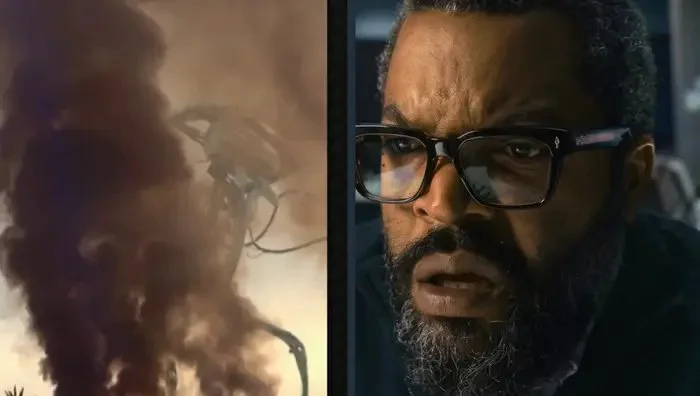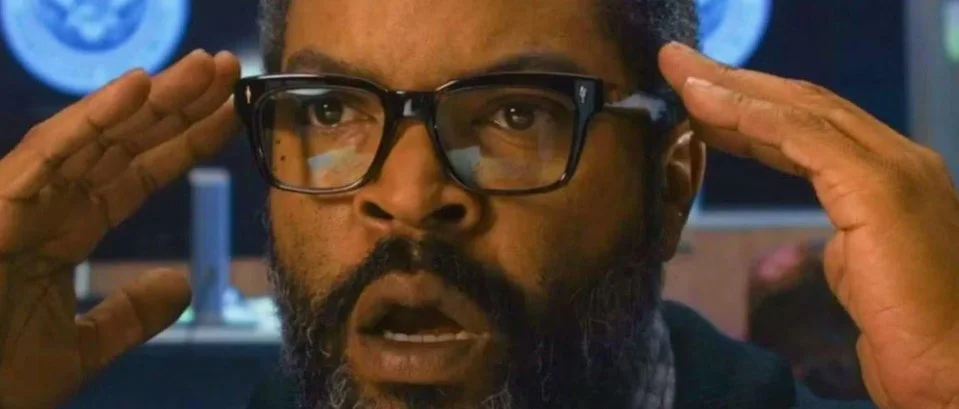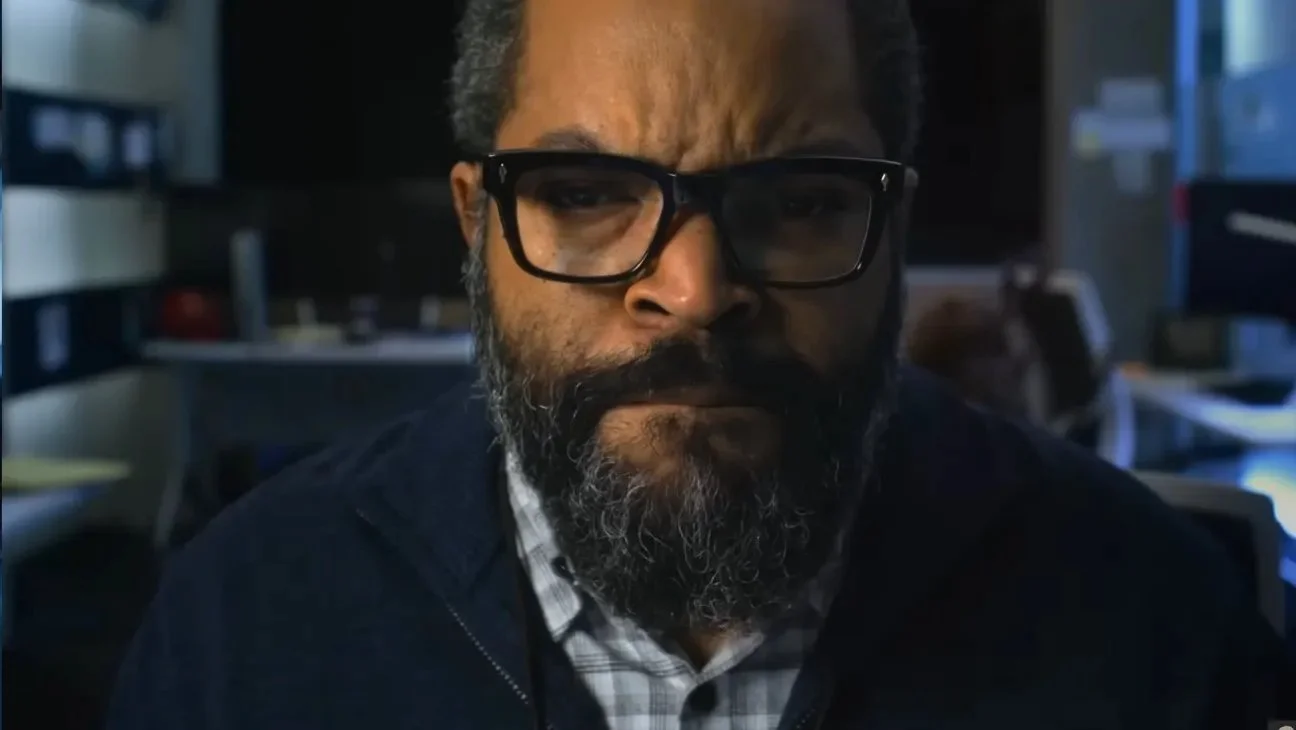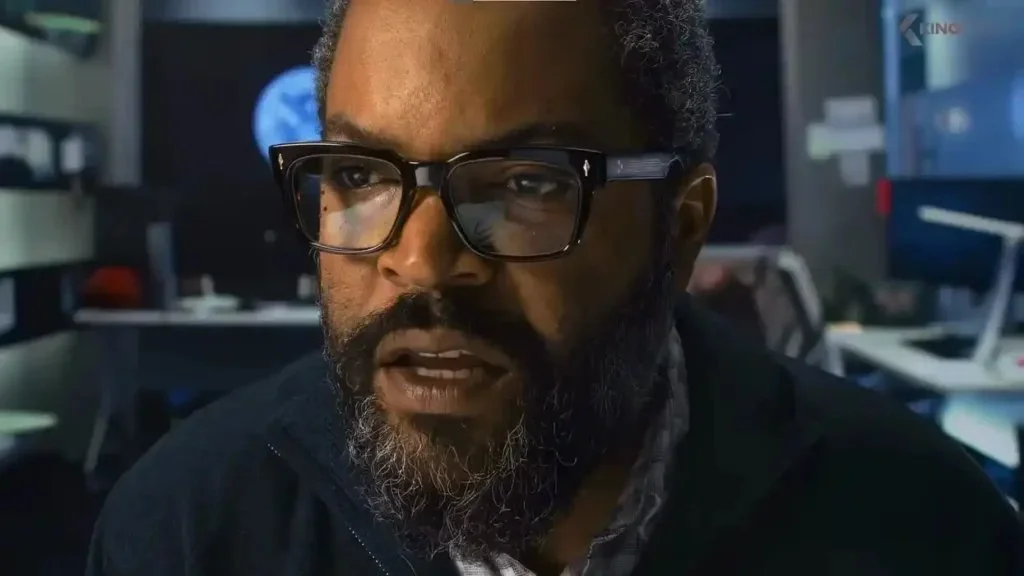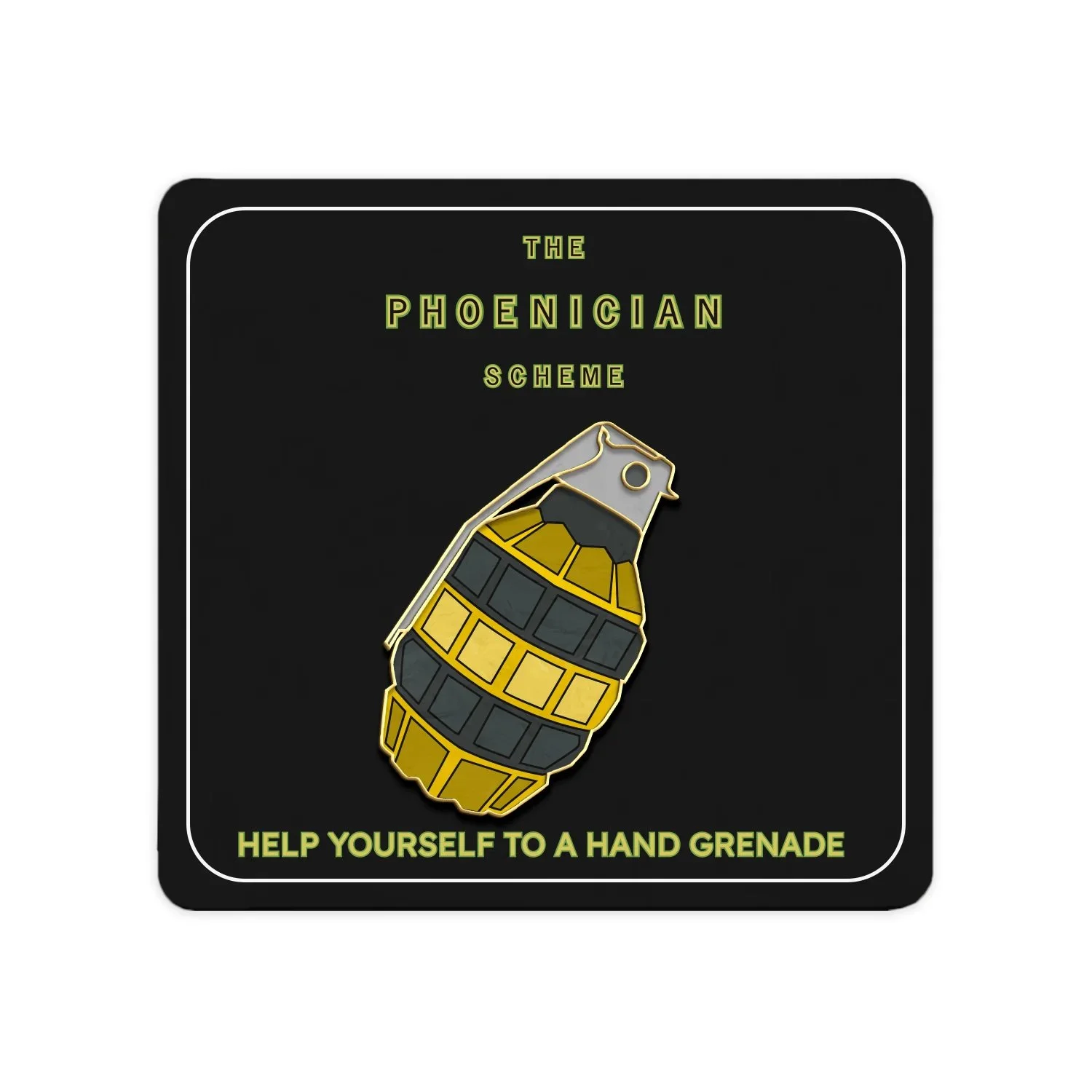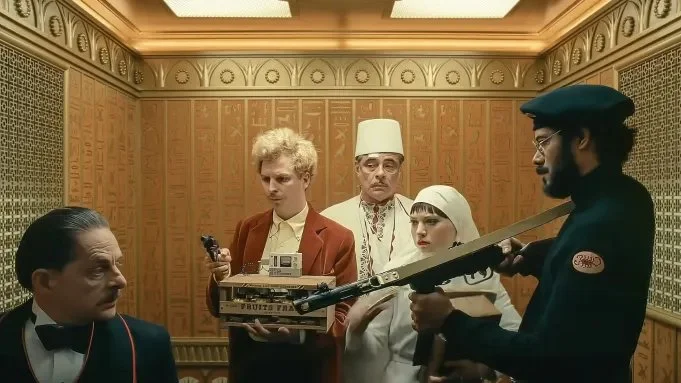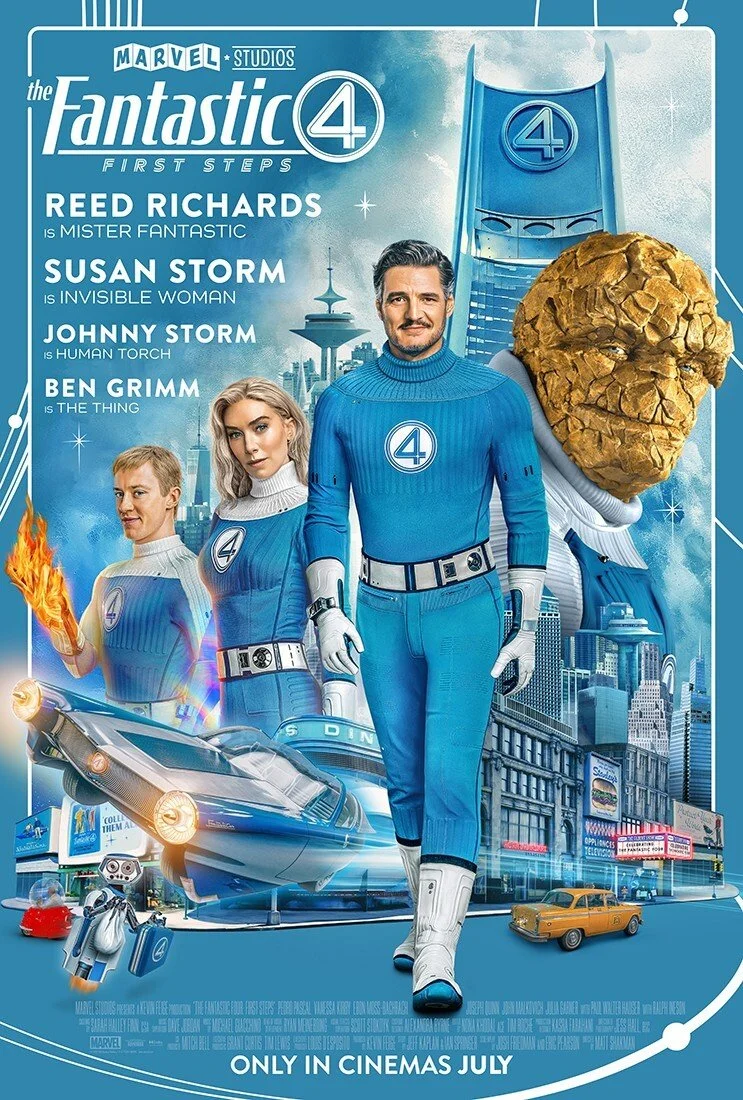Sometimes I don’t know where to start because I’m so overwhelmed by a movie’s brilliance that building something to share with you and paring down the themes in a way that I hope will inform your viewing experience should you take the time to watch said movie can be hard when staring at a blank screen. The movie I’m bringing you today is not that kind of movie.
No, today I’m bringing you a movie that is so bad, I don’t know where to begin with it at all. I’m talking about the 2025 Prime Video original film, War of the Worlds. Starring Ice Cube (21 Jump Street, Three Kings) and Eva Longoria (Desperate Housewives, Nespresso: The Detective). A COVID-19 production, it was filmed entirely remotely and is told through computer screens and phone footage. That’s not the best way to make a film, as admirable as it is that it could have been done during the pandemic; why this movie took 5 years to get to streaming, I’ll never know. But by now, it feels like the death knell for this format of storytelling, after films like Searching (2018) and Missing (2023) and shows like Staged (Britbox’s excellent pandemic dramedy starring David Tennant and Michael Sheen) and Modern Family managed to do it so effectively. Unfortunately for anyone who wants to delve into this creative form of storytelling, it will forever be haunted by the ghost of War of the Worlds; this feels like the “jump the shark” moment for this narrative structure.
Adapting any novel is difficult, especially trying to take one that is so outdated and has many adaptations to its name already. And it proved to be too difficult a challenge for the team behind this one.
Will Radford (Ice Cube) logs into his job at Homeland Security, firing up the invasive surveillance machine to spy on just about everyone and everything—people on the streets, government buildings, and above all, his own children. Radford is about the most unsympathetic protagonist I can remember watching in a long time; as he’s going about his threat checks, he gets a call from Sandra NASA (Eva Longoria). I’m not sure if her name is Sandra NASA, but since she also works at NASA, that would be quite the coincidence. Am I the only person who puts first and last names in their phone? After undergrad, I looked at my contacts and realized having 8 entries that just said “Mike” (and one that said “Mike vodka double shot?”) wasn’t a very efficient way of keeping in touch with people. Was that one Mike with 8 different phone numbers? Was it 8 different Mikes? There’s no way I knew that many people named Mike. Anyway, she’s asking about very strange weather patterns that are becoming dangerous. He immediately dismisses her and reiterates that all he cares about are human threats, not the weather. Not only is he running a seriously invasive surveillance program that goes way beyond the NSA’s metadata collection in a very dystopian governmental program, he also loves to spy on his adult children. He calls up his very pregnant daughter Faith to criticize her for buying a muffin for breakfast and tells her to eat a single hard boiled egg instead. And then he hacks her fridge to point out that she’s not eating enough protein.
Just normal dad stuff, right? Not at all controlling, red flag behavior. Then he hacks his son Dave’s computer and deletes a video game off it because he thinks games are a waste of time. Not considering at all that his son’s job involves video games; he just wants him to stop doing whatever he’s doing and join the NSA so he too can be an invasive, rights-violating surveillance jockey for the government. When his son’s protests, he justifies his work because having your rights violated is better than being killed by terrorists. Which is an insane thing to put in a movie that you’re releasing in 2025, a time in which masked men are rolling up in unmarked SUV and black bagging people on the street in the name of a safer society, but I guess this was written during the pandemic, so we weren’t worried about being put in concentration camps back then? It’s okay though, he’s got a dead wife, which is a shortcut to making us care about him. Right? If this is the society we’re fighting for, let the aliens win.
After that lovely interchange between father and son, Faith’s boyfriend Mark calls him up to ask him to reconsider going to Faith’s baby shower. Now, I know what you’re thinking; Radford sounds like he’s be a damn ball at parties, of course they want such a fun guy there. But no, as it turns out Faith never invited Radford to the shower and he didn’t know it was happening. So, taking a moment to reflect on what behavior as a father would lead to his daughter not wanting him to share in that wonderful moment together, he realizes his mistakes as a parent and starts to make positive changes in his relationship with his children. I’m kidding, of course. His immediate response is to hack her computer and spy on her iMessages with her boyfriend so he can see what they’re saying about him. Very healthy. Not at all a massive violation of trust. And also probably not something you’re supposed to do when working at DHS. If one of his coworkers caught him using government resources to spy on his adult children, he’d have been in lots of trouble. Luckily, for some reason in this massive DHS building, he’s the only one there. He’s the only one in the room, he’s the only one seemingly in the building, and they never explain why or even address it a little bit. While he’s dropping electronic eaves on his daughter, they slot in the heaviest-handed foreshadowing I’ve seen in a movie in some time. Mark reassures Faith that she’s going to save the world someday with her work, a “Cannibal Code” that will rewrite DNA to attack sick cells. If you’ve seen any adaptation of War of the Worlds before or read the book or have seen Independence Day, you know where that particular thread is going.
But being predictable isn’t this movie’s problem. It’s hard not to be at least a little predictable when you’re adapting a 125 year old novel—some plot points are going to make their way into the public consciousness in that time period, as much as you try to avoid spoilers. Everything is this movie’s problem. The writing is baffling at times, the special effects are horrendously bad, often using spotty connections and pixelated VC calls to try to cover up the fact the CGI looks terrible. For a reported $65 million budget, it feels like someone is walking around with $64 million in their back pocket. Back in 2010, Gareth Edwards made Monsters for $500,000 and did the special effects on his laptop in his bedroom and that looked better than this. And so much of the movie just doesn’t make sense. While helping the FBI conduct a raid on Disruptor, an Anonymous-like hacker group, the lead FBI agent puts him on FaceTime and walks into the location with her phone up in one hand and her gun in the other so he could watch the raid as it happens. Shouldn’t the FBI have more specialized gear for that sort of thing? Don’t tell me that bodycams are just cell phones taped to people’s chests. Doesn’t matter though, not a single shot is fired as the hacker they were after wasn’t where they tracked him to. But after that, meteors come raining down all the over the world, peppering the globe with what looks like a massive meteor shower. In a very Star Trek: The Original Series moment, Radford is thrown around a bit in the shock of nearby crashing meteors and spills his coffee on himself. It is a cheesy and an unintentionally funny moment, one of many in the film. Also, throughout the film, there are numerous news reports that are always immediate, accurate, and tailored for Radford to hear exactly what he was hoping not to hear. It constantly takes you out of any modicum of immersion that you can have in this movie. Furthermore, global networks go down, leaving the world’s militaries stranded and planes falling out of the sky; yet when it’s convenient for the plot, everything is working again with no explanation.
Sandra gets to one of the crash sites and, yes, video calls Radford to show him around it. A lot of this movie is based around nonsensical Zoom calls where the person on the phone is doing something that they most definitely should have two hands free while doing and also not splitting focus to look at their phone. As the video feed gets conveniently fuzzy, we see the big reveal; there’s something alive in the meteors! Now, in addition to this pixelated video mechanic not being a compelling storytelling device, much like the conveniently cutting out radios in Jurassic World, it also feels like a shameless way to shove product placement in our faces. Throughout the course of this movie, we see FaceTime, Zoom, Microsoft Teams (RIP Skype), iMessage, and WhatsApp, at the very least, and that’s just in the communication app space. Not only is Faith’s boyfriend an Amazon delivery driver, the phrase “see what’s in their Amazon shopping cart” is used multiple times and someone is even bribed with a $1,000 Amazon gift card. You know, just in case you forgot you were watching the movie on Amazon’s video streaming service. Anyway, the aliens start blowing a bunch of stuff up, including the lead FBI agent. Good thing these characters are all so one-dimensional or that might have been sad. His son calls him, trying to give him what he says is important information, but in typical fashion, Radford dismisses him outright and argues with him for seemingly longer than it would take for Dave to give him the information in the first place. So instead of listening and possibly getting something useful, he just hangs up. Remember, we’re supposed to root for this guy.
All this happens about 25 minutes into the movie, which doesn’t seem like a long time to wait for the big reveal that aliens are coming in your alien movie, but it’s nearly a third of the way into this 91 minute film and it feels like it was an hour. Or two. I was honestly shocked that it was only 25 minutes because it had been such a slog to get there.
Radford watches footage from all over the world, the camera cuts to him writing out what’s happening as it happens, because watching him watch it happen probably isn’t enough for us to get the idea. The movie wants it extremely clear that the aliens who crash landed on Earth and started blowing everything up are really not great folks. He gets in touch with Faith, who for some reason decided to leave the building where she was sheltering because despite being a very smart scientist, she’s incredibly stupid and the movie apparently can’t happen unless an alien tripod attacks her, leaving Radford worried that she died for a few seconds. Because still in the midst of a global attack that is probably killing millions, if not billions of people, the only thing we care about is the protagonist’s family and it’s the only thing he seems to care about. As she’s running away and holding her phone on FaceTime, she falls down. Actually, pretty much everyone who is running from something on a video call falls down, sometimes multiple times. It’s as if trying to look at a phone while running from chaos is a bad idea. So her leg is impaled and Radford decides that he’s going to go save her. He runs to the door and it won’t open. “Damn it, they locked it”, he narrates to us in the most unintentionally laugh out loud moment I’ve seen in a movie since I watched Lena Waithe pretend to hand Tye Sheridan a virtual Chucky doll in Ready Player One. Unable to get through the locked glass—yes, glass, the famously impenetrable material that can never be broken by less than superhuman means—door or the glass walls of his office, he settles for hacking a Tesla to get her to a safe place. They have an overwrought heart to heart about the baby shower; you can tell that they thought it would be some sort of emotional catharsis, but it’s executed with the panache of a middle school play. And during this, he starts to write her an email about how hard being a parent is.
We get the reveal of what the aliens are up to and some more very not-surprising reveals as well, and the whole world comes together to protect our “way of life”. Not our very existence, no, our way of life. It makes it seem like the aliens came down to gently get rid of social media and make us be nicer to each other, not exterminate the human population. And so on and so forth, heroic actions abound, conspiracies exposed, and the movie finally comes to an end.
I try my best to find things to like in every movie I watch, I really do. After all, movies are art and there’s subjective interpretation and most of the time, people put a lot of care and effort into bringing these pieces of art to us. But War of the Worlds doesn’t feel like there was care and effort put into it. It felt like a commercial product incompetently made and offered for our consumption. This is a movie that makes Electric State look watchable and like The Gorge, it felt more like it would have been an engaging game rather than a movie. This is a movie with a 3% on Rotten Tomatoes and I’m still trying to figure out how 3% of critics (and 21% of audience reviewers) found anything enjoyable about this movie. The moments of unintentional hilarity are not enough to redeem War of the Worlds or turn it into a so-bad-it’s-good movie; it’s just bad. If you’re in the mood for down to earth alien invasion sci-fi, I would highly recommend not wasting your time on this and instead watching the aforementioned Monsters (while Gareth Edwards has had more misses than hits at the helm, Monsters put him in line to give us Rogue One) or the absolutely deep, well-thought out, well written, well acted, and well directed Attack the Block, which is everything that this movie is not.
And readers, if you felt like the pictures included in this post were a bit repetitive, imagine what it was like watching the movie because that’s pretty much how it went. 90 minutes of Zoom calls and Ice Cube reaction faces until the credits roll.




